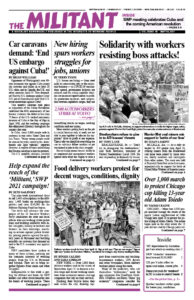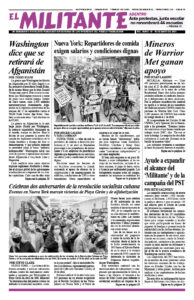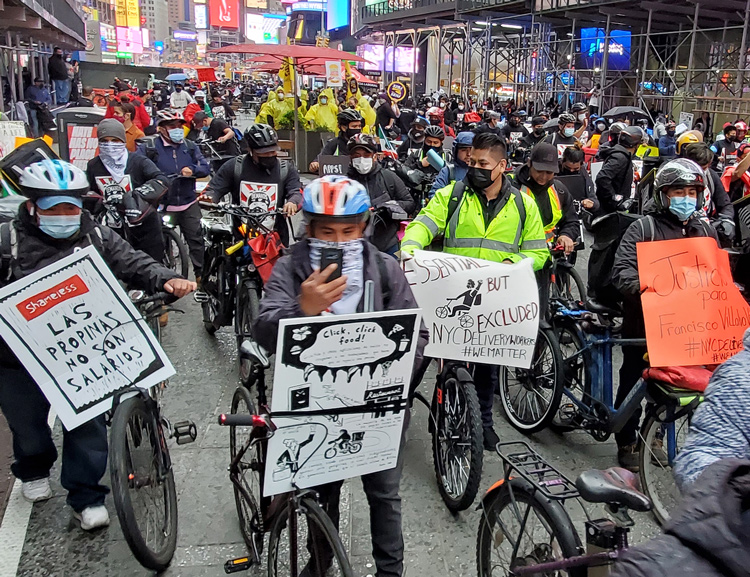NEW YORK — Over 1,000 food-delivery workers took to the streets of Manhattan April 21 to demand a livable wage and decent working conditions from restaurant owners and app companies that rely on their services.
Honking their bicycle horns they rode across the city, drawing support from construction and building-maintenance workers, UPS drivers and other bystanders. More delivery workers joined along the route.
Many of the protesters, who call themselves “deliveristas,” work for app companies like DoorDash, GrubHub, UberEats, and Relay. These “gig economy” companies consider the workers “independent contractors,” not employees.
While each company works a little differently, these workers are shut out of benefits, including a minimum wage, overtime pay and paid sick leave. They take all the risks while the companies rake in the profits. They must supply their own electric bikes, at a cost of around $1,500, insulated backpacks for the food, and can pay hundreds of dollars for parking and charging their bikes. When the bikes break down or are stolen, which happens often, the workers are responsible for replacing them.
A delegation from Local 32BJ of the Service Employees International Union, which has been lending support to the delivery workers’ fight, participated in the protest. Relatives of Francisco Villalva Vitinio, a delivery worker killed March 29 after refusing to give up his electric bike during an armed robbery, also joined the protest.
At a rally at the end of the march, the names of a dozen delivery workers who had died on the job were read, to resounding cries of “Presente!”
The action was one in a series of protests organized over the last year by Los Deliveristas Unidos and the Worker’s Justice Project. A surge in violent robberies of e-bikes and money has sparked broad indignation about the conditions delivery drivers are forced to work in.
“It’s too much injustice, too much arbitrariness. The apps are abusing people and that has to stop,” Gustavo Ajche, a leader of Deliveristas Unidos, told the Militant during the march. “Thanks to our union we’re raising our voice because we deserve to be treated with respect.”
80,000 deliveristas in New York
Many drivers went to work for the app companies after they lost jobs when government-mandated shutdowns closed restaurants and other workplaces at the start of the coronavirus pandemic. Over the last year the number of deliveristas grew to an estimated 80,000 in New York City alone. The majority of these workers are originally from countries in Latin America. Others include Asian- and African-born workers.
“The app companies say working for them is a ‘big opportunity,’ but we are barely surviving. And the bills are piling up,” said Rogelio Martínez, who worked as a line cook at a hotel before the shutdowns.
Protesters say they often don’t receive timely payment from the app companies or the tips that customers include on their credit-card payments, and can be arbitrarily blocked from the app entirely.
“I was blocked without an explanation, and I am still waiting for an answer,” said delivery worker Lucy Villano, at a press conference the day before the march. “We are sometimes blocked for just using the wrong entrance at a restaurant.”
“Some companies keep the tips, and pay per order, no matter how far we have to travel to deliver it,” Carmelo Jiménez, originally from Mexico, told the Militant.
The workers are demanding the city pass laws requiring that the restaurants they service allow them to use their bathrooms, and that the city establish protected public rest areas. The workers are rarely allowed into the restaurants and are forced to wait outside in rain, snow or whatever until an order is ready.
Workers explained that the app companies often assign them oversized loads, including boxes of food donations from city agencies, making their jobs unsafe. These boxes should be delivered by car, several protesters said. “If we get in an accident nobody pays for our injuries or the damage to our bikes,” Velásquez Ramírez added.
“The delivery-workers community is big and speaks different languages,” said Ligia Guallpa, Worker’s Justice Project director. As part of building the action, leaflets and videos were produced in English, Spanish, French and Bengali. Guallpa invited Mamadou Kokrina, a delivery worker from Mali, to speak, “because our brothers from West Africa also faced the same conditions.”
“Today is a manifestation of anger,” Kokrina said, as he pressed their demands for better conditions and to be treated with respect, and thanked everyone for coming.
“We did something good today,” Guallpa said at the end of the rally, as people gathered around for tamales and hot cocoa, because “like the compañeros here have said, ‘We work to be able to live, not to die.’”
Róger Calero is the Socialist Workers Party candidate for mayor of New York. Sara Lobman is the party’s candidate for Manhattan Borough president.


